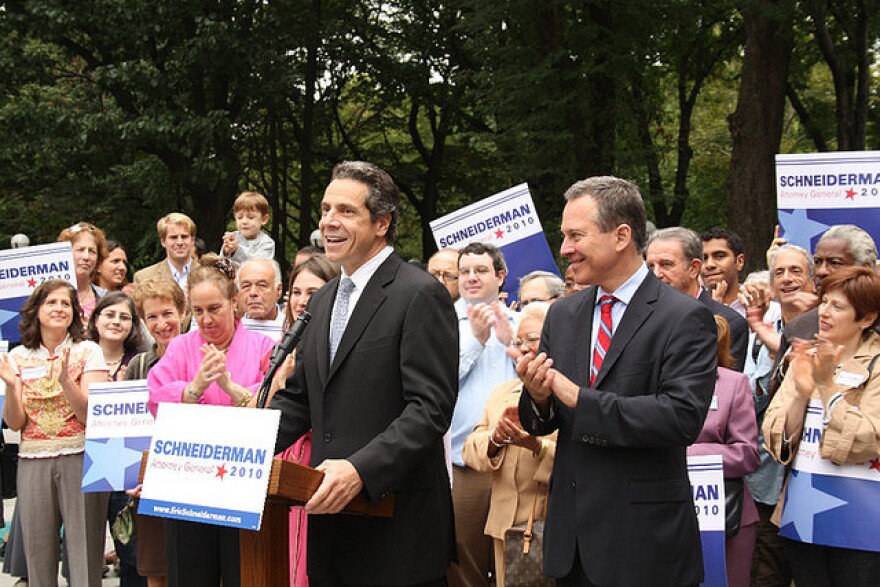The race for attorney general is the closest of all the statewide contests. Democrat Attorney General Eric Schneiderman says he wants another four years to continue what he says have been numerous successes, while his Republican opponent, John Cahill, says the incumbent has not been aggressive enough and is too cozy with the political establishment in Albany.
Schneiderman leads Cahill by double digits in the polls. But Cahill, who’s been as close as 16 points behind, compared to the race for governor and state comptroller where the margins are much wider, says he hopes to benefit on Election Day from congressional and state Senate races where other GOP candidates are running strongly.
Cahill, a top aide and official in former Gov. George Pataki’s administration, says his central theme is that the incumbent has not been strong or independent enough in the office, and that he’d do the job differently.
“The issue of independence and integrity in the office of attorney general is the underlying issue of the campaign,” Cahill said. “And whether he has actually stood up to the powers that be, particularly in Albany.”
Cahill says as attorney general he’d bring more focus to creating jobs and helping small business, improving education and protecting charter schools, and fighting crime.
There have been a number of charges and countercharges in the race, including the controversy over an anti-corruption commission shut down by Gov. Andrew Cuomo, and now under federal investigation. The attorney general is involved because he deputized the commissioners as assistant attorneys general. For much of the campaign, Schneiderman had remained silent, saying he could not comment on an ongoing federal probe.
Cahill says there are times the attorney general has failed to assert his independence and he says there are things Schneiderman could and should say without harming the investigation, including whether the attorney general backed the decision to shut down the commission mid-investigation.
“For instance, did he agree with Gov. Cuomo?” Cahill asks. “Who were his appointees? Who took the oath of office? These questions have nothing to do with the ongoing investigation by the U.S. Attorney’s office.”
Schneiderman began speaking out more fully about his role in the commission in the final days of the race. In an interview with public radio and TV, he says his opponent must not understand the nature of a criminal investigation. He says when “there are people who run their mouths before you’ve completed the investigation,” it can effect witness protection and tip off suspects.
“I’m not going to jeopardize an ongoing criminal investigation,” Schneiderman said. “Just to answer a cheap political point.”
Schneiderman would not say whether he agrees with Cuomo’s decision to disband the commission early, but he says that it was, essentially, the governor’s show.
“The Moreland Commission is set up by the governor,” Schneiderman said. “He has complete jurisdiction over it.”
The attorney general is also conducting his own investigation of evidence gathered in the Moreland Commission probes.
Schneiderman, a former longtime state senator, says he wants to be reelected to continue the work he’s begun as attorney general. He says he teamed up with the state comptroller to bring corruption charges against 50 state and local elected officials, engineered $4 billion in settlements with Wall Street firms on the mortgage crisis, and closed a loophole for background checks on the sale of guns at gun shows.
“I love the job,” Schneiderman said. “Our commitment is to take on tough fights for everyday New Yorkers who want to know that there is one set of rules for everyone.”
Schneiderman is not as well known among the public as previous Attorneys General Eliot Spitzer and Andrew Cuomo.
Cahill says that’s because Schneiderman has not reached out to the people of the state beyond his home base of New York City. The Republican candidate, who has campaigned extensively upstate and on Long Island, says few there know who the current attorney general is.
“Frankly, he hasn’t done his job,” Cahill said.
Both Spitzer and Cuomo had hard-charging styles and went on to become governor. Schneiderman would not rule out seeking higher office later, but he says he’s perceived as low key because he’s not like his predecessors in temperament.
“It’s a peculiar charge,” Schneiderman said. “It’s sort of a ‘why aren’t you doing more grandstanding’ charge.”
On the issues, Cahill is for hydrofracking, while Schneiderman has filed lawsuits for greater regulation of fracking and says there’s danger in rushing to drill. The attorney general has accused Cahill of being an unregistered lobbyist for gas companies, something Cahill denies.
Schneiderman supports a woman’s right to choose abortion and backs a proposal by Democrats to codify the rights in Roe v. Wade into state law. Cahill is pro-life, but would not try to overturn New York’s laws, where abortion has been legal since 1970.
Both candidates support the Dream Act, which would give college aid to children of immigrants who are in the country illegally.
Schneiderman, who began the race with $7 million, has far outspent Cahill and has been running numerous TV ads touting his record in the final weeks of the race, though Cahill says there is late money coming in to his campaign. The attorney general says he plans to campaign with Cuomo and the rest of the statewide Democratic ticket in the days leading up to the election.






